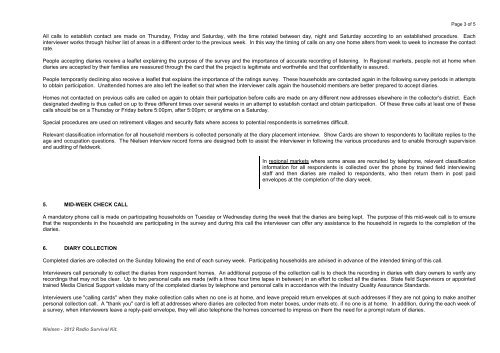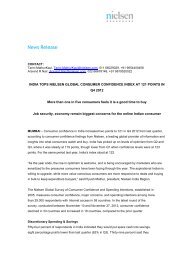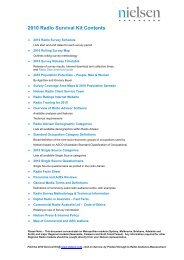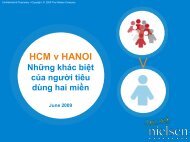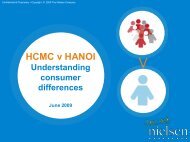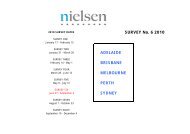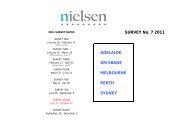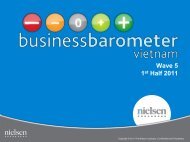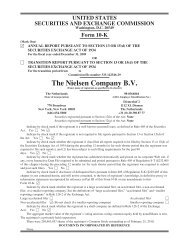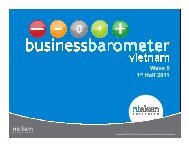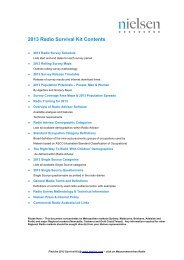2012 Radio Survival Kit Contents - Nielsen
2012 Radio Survival Kit Contents - Nielsen
2012 Radio Survival Kit Contents - Nielsen
You also want an ePaper? Increase the reach of your titles
YUMPU automatically turns print PDFs into web optimized ePapers that Google loves.
<strong>Nielsen</strong> - <strong>2012</strong> <strong>Radio</strong> <strong>Survival</strong> <strong>Kit</strong>.<br />
Page 3 of 5<br />
All calls to establish contact are made on Thursday, Friday and Saturday, with the time rotated between day, night and Saturday according to an established procedure. Each<br />
interviewer works through his/her list of areas in a different order to the previous week. In this way the timing of calls on any one home alters from week to week to increase the contact<br />
rate.<br />
People accepting diaries receive a leaflet explaining the purpose of the survey and the importance of accurate recording of listening. In Regional markets, people not at home when<br />
diaries are accepted by their families are reassured through the card that the project is legitimate and worthwhile and that confidentiality is assured.<br />
People temporarily declining also receive a leaflet that explains the importance of the ratings survey. These households are contacted again in the following survey periods in attempts<br />
to obtain participation. Unattended homes are also left the leaflet so that when the interviewer calls again the household members are better prepared to accept diaries.<br />
Homes not contacted on previous calls are called on again to obtain their participation before calls are made on any different new addresses elsewhere in the collector's district. Each<br />
designated dwelling is thus called on up to three different times over several weeks in an attempt to establish contact and obtain participation. Of these three calls at least one of these<br />
calls should be on a Thursday or Friday before 5:00pm, after 5:00pm; or anytime on a Saturday.<br />
Special procedures are used on retirement villages and security flats where access to potential respondents is sometimes difficult.<br />
Relevant classification information for all household members is collected personally at the diary placement interview. Show Cards are shown to respondents to facilitate replies to the<br />
age and occupation questions. The <strong>Nielsen</strong> interview record forms are designed both to assist the interviewer in following the various procedures and to enable thorough supervision<br />
and auditing of fieldwork.<br />
5. MID-WEEK CHECK CALL<br />
In regional markets where some areas are recruited by telephone, relevant classification<br />
information for all respondents is collected over the phone by trained field interviewing<br />
staff and then diaries are mailed to respondents, who then return them in post paid<br />
envelopes at the completion of the diary week.<br />
A mandatory phone call is made on participating households on Tuesday or Wednesday during the week that the diaries are being kept. The purpose of this mid-week call is to ensure<br />
that the respondents in the household are participating in the survey and during this call the interviewer can offer any assistance to the household in regards to the completion of the<br />
diaries.<br />
6. DIARY COLLECTION<br />
Completed diaries are collected on the Sunday following the end of each survey week. Participating households are advised in advance of the intended timing of this call.<br />
Interviewers call personally to collect the diaries from respondent homes. An additional purpose of the collection call is to check the recording in diaries with diary owners to verify any<br />
recordings that may not be clear. Up to two personal calls are made (with a three hour time lapse in between) in an effort to collect all the diaries. State field Supervisors or appointed<br />
trained Media Clerical Support validate many of the completed diaries by telephone and personal calls in accordance with the Industry Quality Assurance Standards.<br />
Interviewers use "calling cards" when they make collection calls when no one is at home, and leave prepaid return envelopes at such addresses if they are not going to make another<br />
personal collection call. A "thank you" card is left at addresses where diaries are collected from meter boxes, under mats etc. if no one is at home. In addition, during the each week of<br />
a survey, when interviewers leave a reply-paid envelope, they will also telephone the homes concerned to impress on them the need for a prompt return of diaries.


